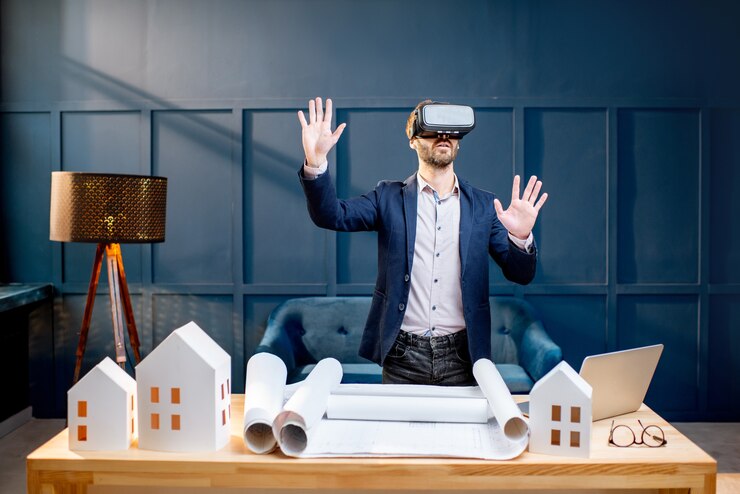From Blueprints to Reality: How VR & AR is Shaping the Future
AR for Real Estate: In recent years, the integration of augmented reality (AR) and virtual reality (VR) technologies has significantly disrupted the real estate development landscape. These immersive technologies offer a myriad of applications that not only enhance the buying experience for potential customers but also streamline various aspects of real estate development. Augmented reality for real estate is not just a futuristic concept; it is a game-changer that has already started reshaping how properties are showcased, marketed, and maintained. According to Goldman Sachs, the prospects for AR/VR solutions in real estate are set to reach $80 billion by 2025. This blog explores key use cases for VR & AR for real estate, shedding light on the transformative power these technologies bring to the industry.

Imagine being able to take a virtual tour of your dream home from the comfort of your living room. AR for real estate enables developers to place cameras strategically within a property, creating immersive virtual tours for potential buyers. This not only allows customers to explore every nook and cranny of property in high resolution but also facilitates remote property viewing when deciding to buy property in Dubai or any other market. Virtual tours can be easily shared on property listings or real estate websites, catering to buyers who may be located far away from the physical property. Moreover, the versatility of AR technology ensures that multiple properties can be viewed conveniently within a short span, thereby broadening the scope of options available to potential buyers.

Beyond the confines of a property's walls, AR for real estate extends to the surrounding neighbourhood. Virtual bike tours created through AR technologies provide potential buyers with a unique perspective when deciding to buy property in Dubai & other regions. They can experience the neighbourhood, ride through its streets, and get a feel for the overall ambience. This feature is particularly valuable for those buyers who consider the surrounding environment a crucial factor in their decision-making process.
AR for real estate is not just about virtual tours; it's also a powerful tool for information dissemination. AR applications enable users to gather essential information about real estate objects effortlessly. By simply pointing a smartphone at a building, potential buyers can access details such as price, square footage, and other relevant information. This turns a casual walk or drives through a neighbourhood into an insightful and interactive shopping tour, enhancing the overall experience for potential customers.

Interior design is a crucial aspect of real estate, and VR & AR for real estate are revolutionizing how designers visualize and plan spaces. Designers can use AR/VR to virtually place furniture and experiment with various decor styles in a virtual environment. This not only reduces the traditionally costly and time-consuming trial and error stages but also provides unlimited design options. Virtual staging becomes quick, easy, and often more cost-effective than traditional methods.
AR for real estate extend beyond visualizing spaces; it assists in practical aspects of development, such as capturing dimensions and creating floor plans. AR & VR Apps allow for quick and accurate measurements, eliminating the need for physical rulers. This efficiency not only benefits developers but also provides potential buyers with detailed and accurate information about the property's layout.

Maintenance is a crucial aspect of property management, and VR & AR for real estate can streamline this process. Virtual reality headsets can offer maintenance crews a 3D view of plumbing or electrical systems, making it easier to identify and diagnose hassles. Maintenance checklists and tutorials for new workmen can also be created using these technologies, ensuring a more efficient and systematic approach to property maintenance.

In conclusion, the application of AR for real estate brings significant benefits to both consumers and businesses. From immersive property showcases to interactive neighbourhood tours and streamlined maintenance processes, AR is transforming the real estate development landscape. As the industry embraces these technologies, the buying experience becomes more engaging, efficient, and tailored to the evolving expectations of modern consumers. AR for real estate is not just a trend; it's a paradigm shift that is reshaping the future of property development. Embrace the revolution, explore the potential of AR for real estate, and redefine the way we envision and experience properties.